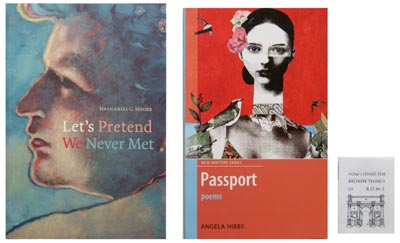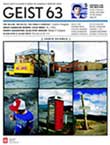Last week we launched Nathaniel G. Moore’s new book of poetry – Let’s Pretend We Never Met – at the Casa del Popolo, “we” being Nathaniel G. himself, Angela Hibbs, Mary Williamson, me, J. R. Carpenter, and some of our closest friends. Perhaps it would have been a good idea to write about this event before it happened, for PR purposes, but things didn’t work out that way. It was a lovely evening thanks to the many sweet friends who showed up minimal prompting.
The first person to thank is Nathaniel, for writing a new book – a new book is always such a good excuse for a reading and a reading is always such a good excuse for hanging out with friends and drinking. A far as I know Nathaniel and I have never pretended that we never met. We’re both Rome junkies. Let’s Pretend We Never Met riffs on the poems and life of Catullus, a Roman poet of the first century BC. Catullus was the first to write about his personal life in the tawdry way we all do nowadays. Nathaniel drags the lusty lovelorn mourning Catullus kicking and screaming, leering and heavy petting into the twenty-first century – or at least into the nineteen-eighties – into a grimly-lit rec-room reality-TV sort of post-pubescent angst. Which sounds awful, but it totally works. Let’s Pretend is a weirdly compelling book – or maybe it’s a concept album? Anyway, pound-for-pound it’s a page-turner.
Another person to thank is Angela Hibbs. Her book is smaller and redder and there’s a girl on the front instead of a guy. Passport is a collection “escape from Newfoundland poems.” I don’t think Ms Hibbs would mind them characterized in this way. They’ve got enough perspective in them to indicate to the reader that the author did indeed escape, but at the same time enough razor-burn rawness to them to indicate that it was a narrow escape, an all-around close call. I would also like to thank Angela for wearing short-shorts, thigh-high stockings and high-heeled cowboy boots.
Third up was Mary Williamson who read a story not presently in a book but bound to be one day. I’d only just met Angela and Mary three nights previous. On that occasion Angela was wearing a blond wig and a gold lame gown and Mary was wearing a redhead wig and a baby blue ball gown and then a red brocaded and fringed flapper number which she kept hiking up to dance flapper-type dances. Given the flapper theme it was all one could do to refrain from yelling: Nice gams! At the reading Mary was reading a story from a boy’s point of view so she was wearing a boy’s cap, undershirt, and jeans found in the garbage. Nathaniel was wearing pants found in the garbage too. Or maybe his were from a yard sale. Mine were.
I was wearing a pair of super skinny jeans bought up the street at a yard sale for three bucks. It’s hard not to buy three-dollar jeans. It’s also hard to sit down in them, these ones anyway. These are my standing up jeans, I kept saying to reading attendees lest they think me pacing nervously. I read some Rome related stuff: Notes On Arrival, a short prose poem culled from the How I Loved the Broken Things of Rome web project; A Timeline of Notable Arrivals in Rome, a new piece written especially for this reading, and Roads Out of Rome, another piece that began as part of Broken Things and was then expanded and adapted and eventually made its way into Geist last winter.
Highlights of the evening included – in no particular order: when, in my reading of A Timeline of Notable Arrivals in Rome, I skipped ahead 1200 years and paused and said – I’m skipping ahead here – and everybody laughed (phew); when friends showed up even though it was summer and Tuesday and a poetry reading no less, and when the afore-mentioned Angela Hibbs showed up in short-shorts.

Nathaniel G. Moore, Let’s Pretend We Never Met
Angela Hibbs, Passport
J. R. Carpenter, How I Loved the Broken Things of Rome
. . . . .


